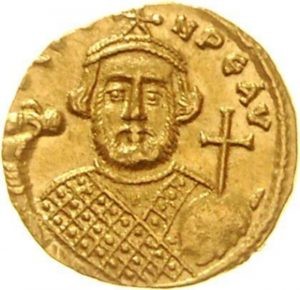– Anastasios
Christian apologist Leontius was born probably around 485 in Byzantium to a rich family. He was attracted from young age to monastic life. He was influenced in his early years by Nestorian heresies, but will return to the true faith after the Council of Calcedonia. He was a great fighter for the faith and will defend orthodoxy in every possible occasion and with every means. He will die in 543.
Adrian Fortescue will write about him in 1913: “The works ascribed to Leontius Byzantinus are: (1) three books Against the Nestorians and Eutychians (commonly quoted as Contra Nestorianos et Eutychianos). This is certainly authentic (in other words, the person about whom they dispute is the author of this work). It is his earliest composition. Book I refutes the opposite heresies of Nestorius and Eutyches, and establishes the Faith of Chalcedon. Book II, in dialogue form, refutes the heresy of the Aphthartodocetes (mitigated Monophysites who made our Lord’s human nature incorruptible during His life on earth – therefore not a true human nature). Book III (the title of this book in Migne belongs really to Book II) accuses the Nestorians of dishonest practices to make converts, and vehemently attacks Theodore of Mopsuestia. The whole work is full of well-selected quotations from the Fathers, and shows great learning and controversial skill. All the other works have been disputed, at least in their present form. (2) Against the Monophysites (Adv. Monophysitas), in two parts, but incomplete. Part I argues philosophically from the idea of nature; part II quotes the witness of the Fathers, and refutes texts alleged to favour Monophysitism. (3) Against the Nestorians (Adv. Nestorianos) in eight books, of which the last is wanting. “A classical work” (Nirsehi, op. cit., 555), explaining and defending all the issues against this heresy. Book IV defends the title Theotokos; Book VII defends the formula: “One of the Trinity suffered”. (4) Scholia or Of Sects (De Sectis); ten chapters called Acts (Praxeis) against all the known heretics at that time, including Jews and Samaritans. (5) Solution of the arguments proposed by Severus (of Antioch; Adv. Severum P.G., LXXXVI, 1915-46). A refutation of Monophysitisim in dialogue form. It supposes a Monophysite work (otherwise unknown) whose order it follows. (6) Thirty chapters against Severus (Triginta capita), a short work with many parallels to the preceding one. (7) Against the frauds of the Apollinarists (Adv. fraudes Apollinaristarum), a very important work, the beginning of the discovery of the works of Apollinaris of Laodicea which still occupies the minds of students. It is an examination of certain works attributed to Athanasius, Gregory Thaumaturgus, and Pope Julius, which are declared to be really by Apollinaris, and fraudulently attributed to these Fathers by his followers. (8) Discussions of Sacred Things, by Leontius and John (De rebus sacris). This is a recension of the second book of the Sacra Parallela (collections of texts of the Fathers) of which a version is also attributed to St. John Damascene (c. 760). (9) Two homilies by a priest Leontius of Constantinople (P.G., LXXXVI, 1975-2004), certainly another person. Of these works, (1) is certainly genuine, (8) and (9) are certainly not. The De rebus sacris was probably composed between 614 and 627. The Leontius of the title is a bishop of that name of Salamis in Cyprus. Of the others, Loofs thinks that (5) and (6) are fragments of a large work by Leontius Byzantinus, called Scholia; (2), (3), and (4) are later works founded on it. (7) is by another (unknown) author, written between 511 and 520. R¸gamer, on the other hand, defends the authenticity in their present form of all these works, except (8) and (9). Leontius of Byzantium is, in any case, a theologian of great importance. Apart from the merit of his controversial work against Nestorians and Monophysites, his Aristotelianism marks an epoch in the history of Christian philosophy. He has been described as the first of the Scholastics (KrumbacherEhrhard, Byzantinische Litteratur, p. 544).”
As we have seen previously, most of the work of these early Church Fathers was in contrast with unorthodox doctrines, an exercise that seems not in touch with today’s acceptance for every possible opinion without the filter of good reasoning and sound faith. People like Leontius remind us that faith and reason go hand in hand and that we cannot follow every opinion without measuring it against the backdrop of what is right and what is wrong. A timeless reminder of our duty as Catholics and of our responsibilities toward our brothers in faith.


 Follow
Follow


